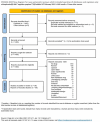Pharmacological Interventions for Negative Symptoms in Schizophrenia: A Systematic Review of Randomised Control Trials
- PMID: 40149518
- PMCID: PMC11940281
- DOI: 10.3390/biomedicines13030540
Pharmacological Interventions for Negative Symptoms in Schizophrenia: A Systematic Review of Randomised Control Trials
Abstract
Background/Objectives: While positive symptoms of schizophrenia are often satisfactorily controlled, negative symptoms are difficult to treat, persisting despite treatment. Different strategies have been devised to deal with this problem. We aimed to review drug treatment for negative symptoms of schizophrenia in controlled trials of marketed drugs. Methods: We searched the PubMed database and the resulting records' reference lists to identify eligible trials using schizophrenia[ti] AND "negative symptom*"[ti] as a search strategy. We determined eligibility through Delphi rounds among all authors. Results: On 11 February 2025, we identified 1485 records on PubMed and 3 more from reference lists. Eligible were 95 records. Most studies were double-blind, randomized controlled trials, carried-out in add-on in patients stabilized with antipsychotics. Other antipsychotics were the most frequent comparators, followed by antidepressants, and recently, antioxidants are gaining importance in trials. Many trials, especially those conducted in the Western world, found no significant effects compared to placebo, while most Iranian studies were positive, although not with a strong effect size. Conclusions: Current research has contributed little to progress in the treatment of the negative symptoms of schizophrenia. The reason might reside in the absence of knowledge of the mechanisms whereby these symptoms are generated, which prevents us from designing possibly effective treatment strategies, and/or to the chronicity of negative symptoms, as they are the first to be established even when they do not become fully apparent.
Keywords: antidepressants; antipsychotics; negative symptoms; pharmacological treatment; schizophrenia.
Conflict of interest statement
The authors declare no conflicts of interest.
Figures
References
-
- Bleuler E. Die Prognose der Dementia praecox (Schizophreniegruppe) Allg. Z. Für Psychiatr. Psych. Med. 1908;65:436–464.
-
- Bleuler E. Dementia praecox oder Gruppe der Schizophrenien. In: Aschaffenburg G., Jakob A., editors. Handbuch der Psychiatrie, Spezieller Teil, 4. Abteilung, 1. Hälfte. Franz Deuticke Verlag; Leipzig, Germany: Wien, Austria: 1911.
-
- Kraepelin E. Psychiatrie. Ein Lehrbuch für Studirende und Ärzte, 6., Vollständig Umgearb. Auflage. Band I: Allgemeine Psychiatrie. Verlag von Johann Ambrosius Barth; Leipzig, Germany: 1899. (Band II: Klinische Psychiatrie).
-
- Morel B.-A. Traité des Maladies Mentales. Librairie Victor Masson; Paris, France: 1860. [(accessed on 11 February 2025)]. Available online: http://catalogue.bnf.fr/ark:/12148/cb309778786.
-
- Huber G. Reine Defektsyndrome und Basisstadien endogener Psychosen. Fortschr. Neurol. Psychiat. 1966;34:409–426.
Publication types
LinkOut - more resources
Full Text Sources


